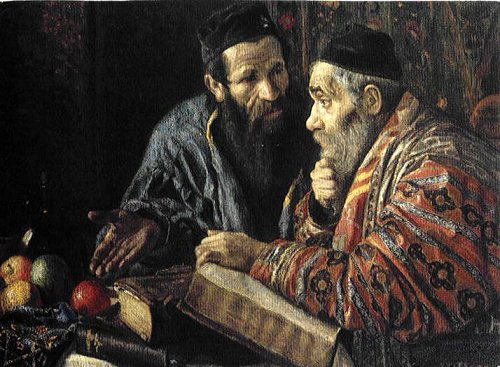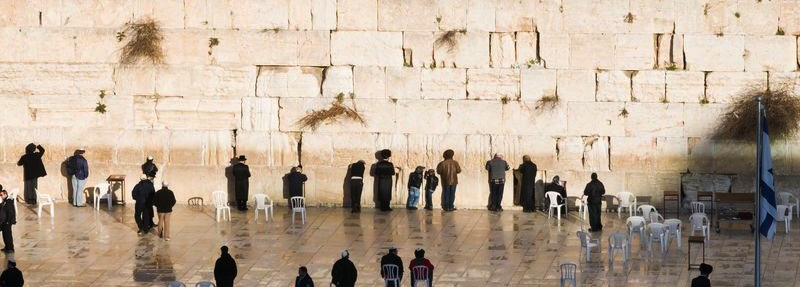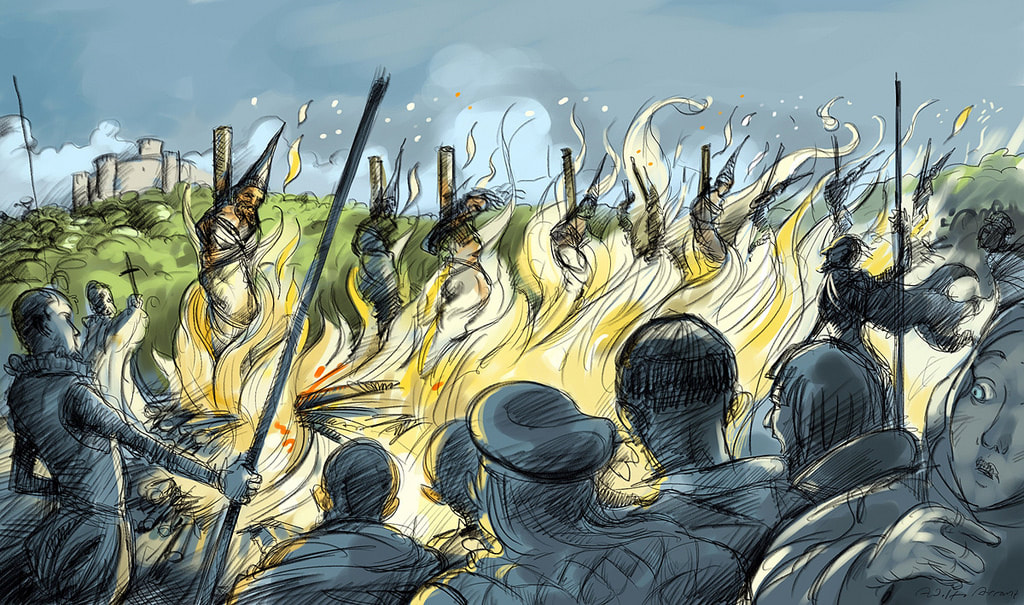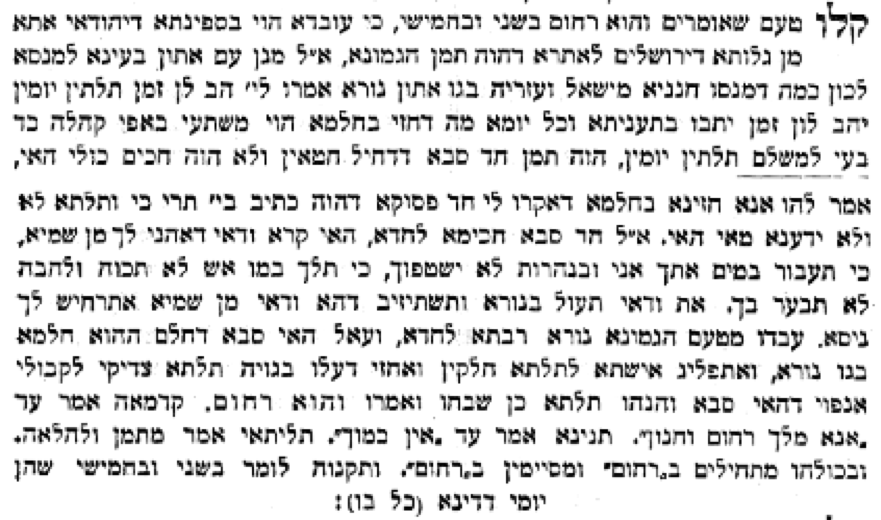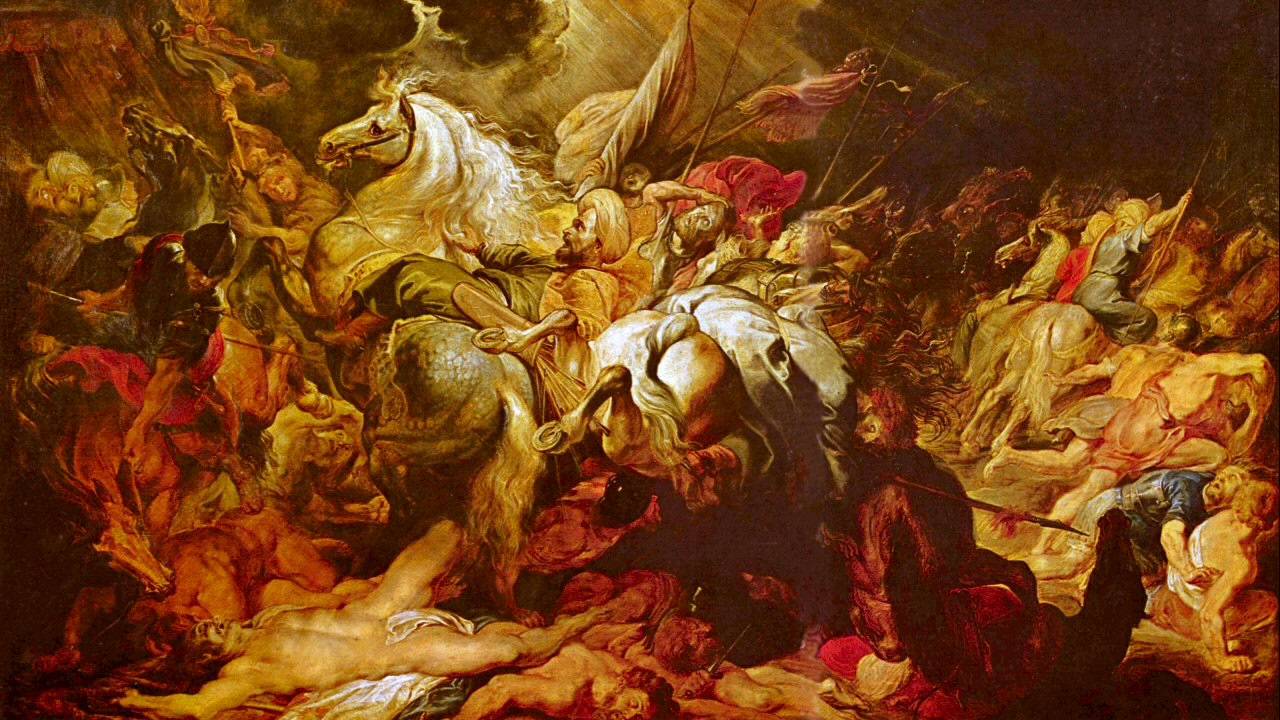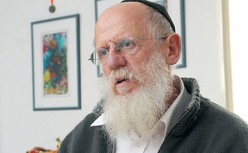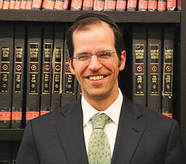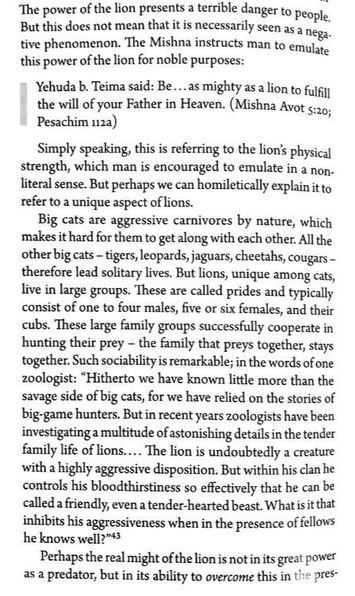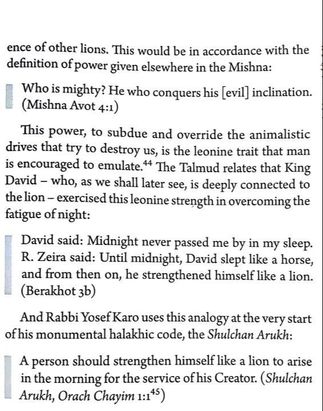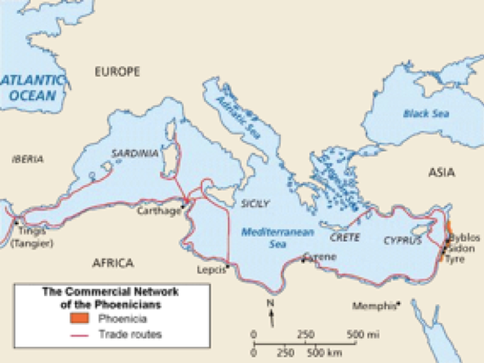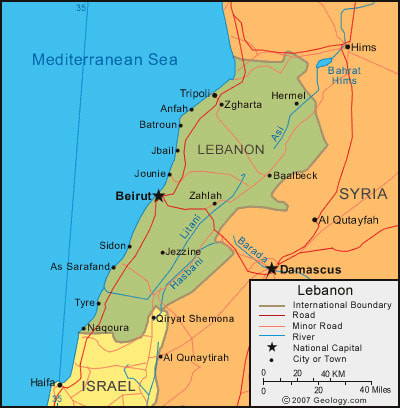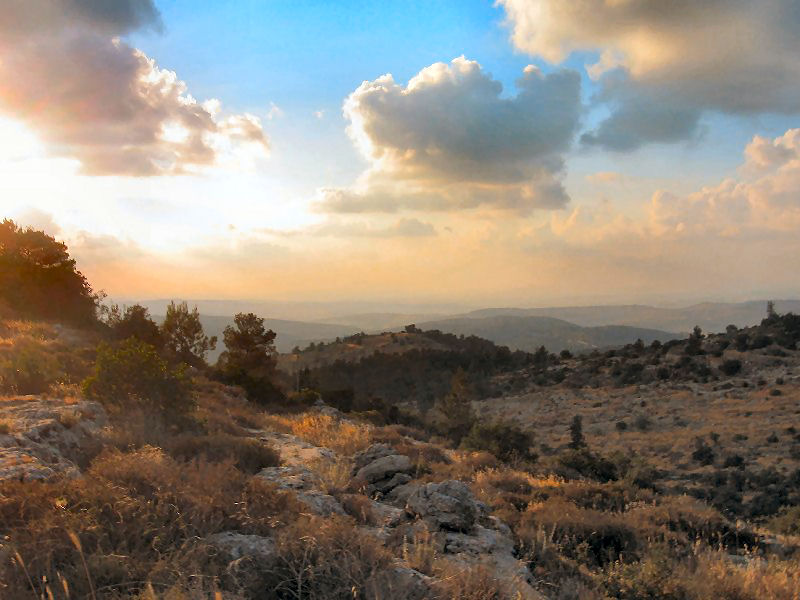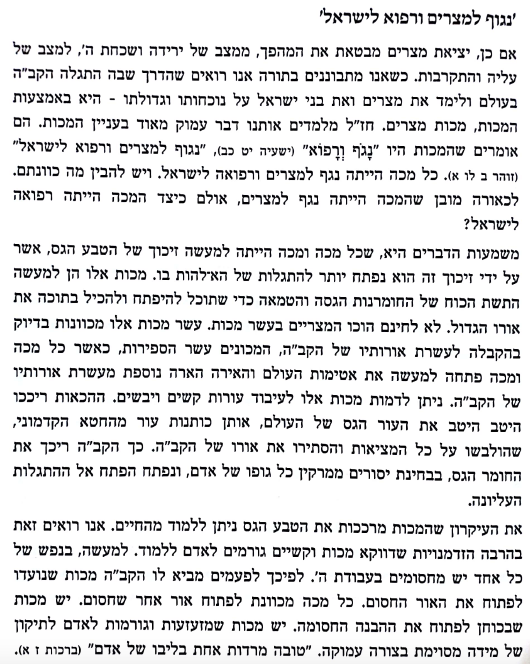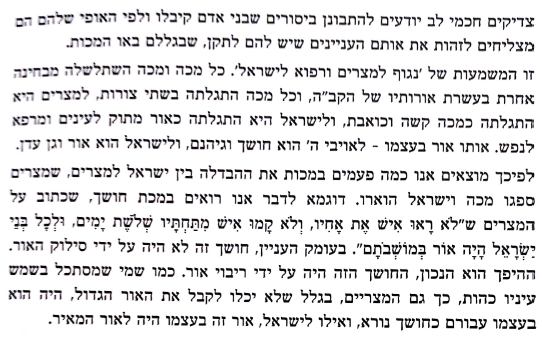|
1 Comment
PodcastsText
HighlightsTrue Peace - Perek 54
Yeshayahu describes a time when Yerushalayim will be the center again for her children and for the Torah center of the world.
Yeshayahu 54:13
וְכָל-בָּנַיִךְ, לִמּוּדֵי ה׳; וְרַב, שְׁלוֹם בָּנָיִךְ
And all thy children shall be taught of the LORD; and great shall be the peace of thy children.
Chazal comment on this pasuk, something which we say quite frequently, in the prayer of Pitum Haketores.
Talmud Bavli Brachos 64b
אמר רבי אלעזר אמר רבי חנינא תלמידי חכמים מרבים שלום בעולם שנאמר (ישעיהו נד, יג) וכל בניך למודי ה' ורב שלום בניך אל תקרי בניך אלא בוניך
Rabbi Elazar said that Rabbi Ḥanina said: Torah scholars increase peace in the world, as it is said: “And all your children [banayikh] shall be taught of the Lord, and great shall be the peace of your children” (Isaiah 54:13). If all the children of Israel are taught of the Lord, there will be peace for all.
The Sages interpreted this verse homiletically: Do not read your children [banayikh], but your builders [bonayikh].
The burning question is that this doesn't seem altogether correct. Aren't the sages arguing all the time? Aren't they the reason for less peace in the world?
Rav Kook, in his explanation of the Siddur, Olas Reiyah, notes that Shalom - Peace - does not mean a monolythic system. Shalom comes from the word Shleimus - completion. To have completion, one must address all perspectives. What the sages are doing in their discussions and arguments is really revealing all the facets of the incredible jewel of the Torah and hence introducing a greater level of Shleimus. Comments
Photo by Johannes Plenio from Pexels
PodcastsTexts
HighlightsThe Eagle - Perek 46
In this section, Yeshayahu describes this strange image which is clearly laden with metaphoric meaning.
Yeshayahu 46:11
מו,יא קֹרֵא מִמִּזְרָח עַיִט, מֵאֶרֶץ מֶרְחָק אִישׁ עצתו (עֲצָתִי); אַף-דִּבַּרְתִּי, אַף-אֲבִיאֶנָּה--יָצַרְתִּי, אַף-אֶעֱשֶׂנָּה.
Calling a bird of prey from the east, the man of My counsel from a far country; yea, I have spoken, I will also bring it to pass, I have purposed, I will also do it.
What is this bird of prey? Who is this bird of prey?
The Radak and the Metzudos reflect this back to the beginning of the perek referring to Cyrus the Great, who will be the tool of Hashem to allow the Jews back to make the second Mikdash and live in the land of Israel once again.
Rashi suggests that it refers back to Avraham Avinu who was summoned by Hashem to lead His plan in this world through Avraham's own children. Avraham had to walk through the four split animals during the Bris Bein Habesarim (in parshas Lech Lecha) as a sign that the Jewish journey through history would be difficult and painful but necessary. Avraham is the symbol for his children to do the same.
The Abarbanel takes this one step further. He notes that there actually was an 'ayit' - a bird of prey at the Bris Bein Habesarim.
Bereishis 15:11
וַיֵּ֥רֶד הָעַ֖יִט עַל־הַפְּגָרִ֑ים וַיַּשֵּׁ֥ב אֹתָ֖ם אַבְרָֽם׃
And the birds of prey came down upon the carcasses, and Abram drove them away.
The Abarbanel argues that ultimately the eagle of Mashiach will descend upon the carcasses of the nations which oppressed us. That is the message to us. Despite all the suffering and injustice, the eagle comes.
Difficulty of Jewish Leadership - Perek 49
Anyone who has tried to get involved in leadership, and certainly Jewish leadership, soon realizes that is is not a simple thing. People have different interests, aspirations and ideas; and very few are willing to compromise. This is not something new at all. Yeshayahu describes his own exasperation when dealing with his people. In fact he almost gives up until he realizes he is serving G-d not the people. Here is how he frames it:
Yeshayahu 49:4
מט,ד וַאֲנִי אָמַרְתִּי לְרִיק יָגַעְתִּי, לְתֹהוּ וְהֶבֶל כֹּחִי כִלֵּיתִי; אָכֵן מִשְׁפָּטִי אֶת-ה׳, וּפְעֻלָּתִי אֶת-אֱלֹהָי
I thought, “I have labored in vain, I have spent my strength for empty breath.” But my case rested with the LORD, My recompense was in the hands of my God.
Ironically it sounds a little but like what Golda Meir once said to President Nixon. Yehuda Avner records in his book, "The Prime Ministers", the following quote:
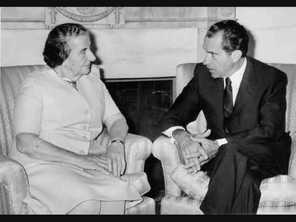
You are the president of 150 million Americans; I am the prime minister of six million prime ministers
CommentsPodcastText
HighlightsNachamu, Nachuma - Perek 40
Perek 40 is the famous Haftorah for parshas Vaeschanan and the first of the 7 prophecies of comfort. This is one of the shifts in tone of the sefer as we move away from rebuke into the prophecies of comfort.
Through Fire and Water - Perek 43
In this perek Yeshayahu makes a powerful statement.
Yeshayahu 43:2
מג,ב כִּי-תַעֲבֹר בַּמַּיִם אִתְּךָ-אָנִי, וּבַנְּהָרוֹת לֹא יִשְׁטְפוּךָ: כִּי-תֵלֵךְ בְּמוֹ-אֵשׁ לֹא תִכָּוֶה, וְלֶהָבָה לֹא תִבְעַר-בָּךְ
2 When you pass through the waters, I will be with you, and through the rivers, they shall not overflow you; when you walk through the fire, you shalt not be burned, neither shall the flame kindle upon you.
sWhat is Yeshayahu referring to?
The Abarbanel says something truly shocking. He explains that Hashem promises to be with us and help us even through the fires of Auto de Fe and the waters of forced baptisms. The thousands of Jews that the Abarbanel witnessed forced into conversion in Catholic Spain and the hundreds burned or killed, were not alone. Hashem was with them.
From the Halachik standpoint, this pasuk is actually the unusual basis for the ritual practice of Tachanun on Monday and Thursdays in the shul. Here is the history.
Sefer Taamei Haminhagim, 136 (quoting the Kolbo)
This story is a metaphor for Jews in exile and acknowledging that Hashem is always with us. It also gives a greater relevance to why we say a longer Tachanun on Monday and Thursday. It is not something to be avoided but rather something to be greatly appreciative for.
CommentsPodcastsText
HighlightsRejuvenation and Redemption - Perek 35
While describing the geulah, Yeshayahu presents very powerful images of the land of Israel flourishing as the redemption arrives. In perek 35 he mentions this a number of times. For example - Yeshayahu 35:6-7
לה,ו אָז יְדַלֵּג כָּאַיָּל פִּסֵּחַ, וְתָרֹן לְשׁוֹן אִלֵּם: כִּי-נִבְקְעוּ בַמִּדְבָּר מַיִם, וּנְחָלִים בָּעֲרָבָה. לה,ז וְהָיָה הַשָּׁרָב לַאֲגַם, וְצִמָּאוֹן לְמַבּוּעֵי מָיִם; בִּנְוֵה תַנִּים רִבְצָהּ, חָצִיר לְקָנֶה וָגֹמֶא.
6 Then shall the lame man leap as a hart, and the tongue of the dumb shall sing; for in the wilderness shall waters break out, and streams in the desert. 7 And the parched land shall become a pool, and the thirsty ground springs of water; in the habitation of jackals herds shall lie down, it shall be an enclosure for reeds and rushes.
This image is so powerful the sages of the Gemara note that the flourishing of the land of Israel is one of the surest signs that the redemption is on the way.
Talmud Bavli, Sanhedrin 98a
ואמר רבי אבא אין לך קץ מגולה מזה שנאמר (יחזקאל לו, ח) ואתם הרי ישראל ענפכם תתנו ופריכם תשאו לעמי ישראל וגו' רבי (אליעזר) אומר אף מזה שנאמר (זכריה ח, י) כי לפני הימים (האלה) [ההם] שכר האדם לא נהיה ושכר הבהמה איננה וליוצא ולבא אין שלום מן הצר
And Rabbi Abba says: You have no more explicit manifestation of the endof days than this following phenomenon, as it is stated: “But you, mountains of Israel, you shall give your branches, and yield your fruit to My people of Israel, for they will soon be coming” (Ezekiel 36:8). When produce will grow in abundance in Eretz Yisrael, it is an indication that the Messiah will be coming soon. Rabbi Eliezer says: You have no greater manifestation of the end of days than this following phenomenon as well, as it is stated: “For before these days there was no hire for man, nor any hire for beast; nor was there peace from the oppressor to him who exits and to him who enters”(Zechariah 8:10). When there are no wages for work and no rent paid for use of one’s animal, that is an indication that the coming of the Messiah is at hand.
We have witnessed this miracle unfolding over the last 150 years. But to fully appreciate how much has occurred, we need to understand how unexpected this growth really is. Here are the words of Mark Twain from his visit to the area in 1867.
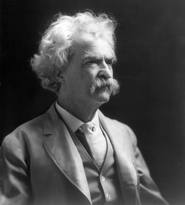
“ ...[a] desolate country whose soil is rich enough, but is given over wholly to weeds-a silent mournful expanse....A desolation is here that not even imagination can grace with the pomp of life and action....We never saw a human being on the whole route....There was hardly a tree or a shrub anywhere. Even the olive and the cactus, those fast friends of the worthless soil, had almost deserted the country.”
- 1867 (Quoted in Mark Twain, The Innocents Abroad. London: 1881)
Sancheriv's Destruction - Perek 37
Yeshayahua describes the events leading up and the actual event of the destruction of Sancheiriv. What is curious is that we have very little understanding about what happened that incredible night when all the 185 000 soldiers dropped dead. Here is what Tanach tells us.
Yeshayahu 37:36
לז,לו וַיֵּצֵא מַלְאַךְ ה׳, וַיַּכֶּה בְּמַחֲנֵה אַשּׁוּר, מֵאָה וּשְׁמֹנִים וַחֲמִשָּׁה, אָלֶף; וַיַּשְׁכִּימוּ בַבֹּקֶר, וְהִנֵּה כֻלָּם פְּגָרִים מֵתִים
36 And the angel of the LORD went forth, and smote in the camp of the Assyrians a hundred and fourscore and five thousand; and when men arose early in the morning, behold, they were all dead corpses.
What actually happened?
Historically speaking there is an interesting suggestion in the words of Josephus, Antiquities X:1:5
"Now when Sennacherib was returning from his Egyptian war to Jerusalem, he found his army under Rabshakeh his general in danger [by a plague], for God had sent a pestilential distemper upon his army; and on the very first night of the siege, a hundred fourscore and five thousand, with their captains and generals, were destroyed. So the king was in a great dread and in a terrible agony at this calamity; and being in great fear for his whole army, he fled with the rest of his forces to his own kingdom, and to his city Nineveh; and when he had abode there a little while, he was treacherously assaulted, and died by the hands of his elder sons, 3 Adrammelech and Seraser, and was slain in his own temple, which was called Araske. Now these sons of his were driven away on account of the murder of their father by the citizens, and went into Armenia, while Assarachoddas took the kingdom of Sennacherib." And this proved to be the conclusion of this Assyrian expedition against the people of Jerusalem.
However, the classic Mefarshim move away from trying to understand exactly what happened but rather why it happened. Here, for example, are the words of R. David Kimchi, the Radak. The focus is more on what we are supposed to take away from this episode.
ואין לשאול טעם למעשה האל יתברך כי ה' נורא עלילות למה לא נגפו אז אלא עד שהלך להלחם עם מלך כוש ואח"כ שב לירושלם והטעם הנראה לנו בזה כדי שיהיה להם לישראל בזת כוש ומצרים ועוד שיראו כוש ומצרים הנפלאות שעשה לאוהביו ולדורשי שמו כי מלך אשור נצח אותם וכל הארצות כבש ובירושלים נגף בלא חרב ובלא חנית והאל נתן בלב מלך אשור להביא חיל מלך כוש ומצרים לירושלים עמו להפחיד יושבי ירושלם עוד:
Who was Merodach-Baladan? - Perek 39
Chizkiyahu welcomes a state visit from his northern ally in Bablyon, Merodach Baladan. Yeshayahu is very displeased with this visit as it indicates Yeshayahu's willingness to put his trust in an anti-Assyrian alliance rather than lying low and trusting in Hashem. To appreciate the context, here is what the Encyclopedia Britannica has to say about who this Babylonian king was and his crucial role in this alliance.
Merodach-Baladan II, Babylonian Marduk-apal-iddina Ii (“Marduk Has Given Me an Heir”), (died c.694 BC), king of Babylonia 721–710 and for nine months in 703, who maintained Babylonian independence in the face of Assyrian military supremacy for more than a decade.
Commencing in 728 the king of Assyria also officially held the title of king of Babylonia. During that time Merodach-Baladan, a member of the Yakin tribe, was a district ruler in Chaldea. During the unrest surrounding the accession of Sargon II of Assyria in 722, Merodach-Baladan entered Babylon and claimed the Babylonian throne, which had belonged to his forebear Eriba-Marduk. An attack by the Elamites two years later so weakened the Assyrians—though both sides claimed victory—that, as king of Babylonia, Merodach-Baladan remained unmolested by Assyria for the next 10 years. According to Assyrian accounts, Sargon marched south against Babylonia in 710. After defeating the Elamites and Merodach-Baladan’s other allies, he turned toward Babylon. Merodach-Baladan fled, and the leading citizens of Babylon brought Sargon unopposed into the city, where he officially became king of Babylonia. The next year Sargon captured and destroyed Merodach-Baladan’s capital, Dur-Yakin. Sometime after the death (705) of Sargon, Merodach-Baladan sent an embassy to Hezekiah of Judah in an attempt to foment unrest against the new Assyrian monarch, Sennacherib. In 703 he again seized the Babylonian throne. Before the end of the year, however, Sennacherib marched south and defeated the Babylonian forces. In 700 Sennacherib marched to Bit-Yakin in pursuit of Merodach-Baladan, who again fled, this time to southern Elam, where he died sometime before 694. CommentsPodcastsTexts
HighlightsChoosing War and Dishonour (Perek 30)
In Perek 30, Yeshayahu describes the misplaced trust of the nation of Israel in their ally in the South - Egypt. They place so much trust in that coalition but ultimately it bears no fruit. In fact, Hashem orchestrates it in such a way that Egypt is exiled even before Israel and watches on helplessly. Hashem admonishes them for trusting in Egypt. If they had chosen trust in God, they would have avoided the war they ended up in.
Yeshayahu 30:15-16
ל,טו כִּי כֹה-אָמַר אֲדֹנָי יְהוִה קְדוֹשׁ יִשְׂרָאֵל, בְּשׁוּבָה וָנַחַת תִּוָּשֵׁעוּן--בְּהַשְׁקֵט וּבְבִטְחָה, תִּהְיֶה גְּבוּרַתְכֶם; וְלֹא, אֲבִיתֶם. ל,טז וַתֹּאמְרוּ לֹא-כִי עַל-סוּס נָנוּס, עַל-כֵּן תְּנוּסוּן; וְעַל-קַל נִרְכָּב, עַל-כֵּן יִקַּלּוּ רֹדְפֵיכֶם
For thus said my Lord GOD, The Holy One of Israel, “You shall triumph by stillness and quiet; Your victory shall come about Through calm and confidence.” But you refused
“No,” you declared. “We shall flee on steeds”— Therefore you shall flee! “We shall ride on swift mounts”— Therefore your pursuers shall prove swift!
My friend, Alan Steinmetz, pointed out a recent occurence of this type of mismanaged trust. In the 1930s the League of Nations witnessed and enabled the rise of Germany as a terrifying power in Europe. But instead of taking careful action, they chose pacifism, which ultimately led to the war they were trying to avoid.

"You were given the choice between war and dishonour. You chose dishonour, and you will have war."
Winston Churchill to Neville Chamberlain Pesach: The Festival of Hovering (Perek 31)
Yeshayahu makes it clear that Hashem will protect the nation of Israel from enemy onslaught. He uses a curious phrase to describe this.
Yeshayahu 31:5
כְּצִפֳּרִים עָפוֹת--כֵּן יָגֵן ה׳צְבָאוֹת, עַל-יְרוּשָׁלִָם; גָּנוֹן וְהִצִּיל, פָּסֹחַ וְהִמְלִיט
Like the birds that fly, even so will the LORD of Hosts shield Jerusalem, shielding and saving, protecting and rescuing.
Comments
Photo by Egor Kamelev from Pexels
PodcastsTexts
HighlightsTwo Worlds, Two Dimensions (Perek 26)
Yeshayahu describes trusting in Hashem in a beautiful poetic line (Yeshayahu 26:4)
בִּטְחוּ בַה׳, עֲדֵי-עַד: כִּי בְּיָהּ ה׳, צוּר עוֹלָמִים
Trust ye in the LORD for ever, for the LORD is GOD, an everlasting Rock.
The Gemara in Menachos 29b teaches us that there is much more being described than simply trusting in Hashem. Yeshayahu is actually describing the difference between the dimension of this world and the next.
כדבעא מיניה רבי יהודה נשיאה מר' אמי מאי דכתיב (ישעיהו כו, ד) בטחו ביי' עדי עד כי ביה יי' צור עולמים אמר ליה כל התולה בטחונו בהקב"ה הרי לו מחסה בעולם הזה ולעולם הבא אמר ליה אנא הכי קא קשיא לי מאי שנא דכתיב ביה ולא כתיב יה כדדרש ר' יהודה בר ר' אילעאי אלו שני עולמות שברא הקב"ה אחד בה"י ואחד ביו"ד ואיני יודע אם העולם הבא ביו"ד והעולם הזה בה"י אם העולם הזה ביו"ד והעולם הבא בה"י
Rabbi Yehuda Nesia asked Rabbi Ami: What is the meaning of that which is written: “Trust in the Lord forever, for in the Lord [beYah] is God, an everlasting [olamim] Rock” (Isaiah 26:4)? Rabbi Ami said to him: Anyone who puts their trust in the Holy One, Blessed be He, will have Him as his refuge in this world and in the World-to-Come. This is alluded to in the word “olamim,” which can also mean: Worlds.
Rabbi Yehuda Nesia said toRabbi Ami: I was not asking about the literal meaning of the verse; this is what poses a difficulty for me: What is different about that which is written: “Forin the Lord [beYah],” and it is not written: For the Lord [Yah]? Rav Ashi responded: It is as Rabbi Yehuda bar Rabbi Elai taught: The verse “For in the Lord [beYah] is God, an everlasting Rock [Tzur olamim]” is understood as follows: The term “Tzur olamim” can also mean Creator of worlds. Theseletters yod and heh that constitute the word yah are referring to the two worlds that the Holy One, Blessed be He, created; one with [be] the letter heh and one with [be] the letter yod. And I do not know whether the World-to-Come was created with the letter yod and this world was created with the letter heh, or whether this world was created with the letter yod and the World-to-Come was created with the letter heh. Songs of Victory (Perek 26)
How many contemporary Jewish songs did you find in perek 26? I found three.
Accepting Charity from non-Jews (Perek 27)
Poetically Yeshayahu relates a description of the fall of the enemies of the Israelites (Yeshayahu 27:11)
בִּיבֹשׁ קְצִירָהּ, תִּשָּׁבַרְנָה, נָשִׁים, בָּאוֹת מְאִירוֹת אוֹתָהּ: כִּי לֹא עַם-בִּינוֹת, הוּא--עַל-כֵּן לֹא-יְרַחֲמֶנּוּ עֹשֵׂהוּ, וְיֹצְרוֹ לֹא יְחֻנֶּנּוּ.
When its crown is withered, they break; Women come and make fires with them. For they are a people without understanding; That is why Their Maker will show them no mercy, Their Creator will deny them grace.
This verse is actually one of the foundations for an immensely complex topic about receiving charity from non-Jews based on Chazal's explanation of this pasuk in Bava Basra 10a. For an excellent shiur on this topic, Rabbi Aryeh Lebowitz addresses this topic on YUTorah.org
The Strength of Lions (Perek 29)
Yeshayahu uses a beautiful description of the Mizbeiach, the alter, in the temple. He calls it: Ariel - the lion of God. (Yeshayahu 29:1)
הוֹי אֲרִיאֵל אֲרִיאֵל, קִרְיַת חָנָה דָוִד; סְפוּ שָׁנָה עַל-שָׁנָה, חַגִּים יִנְקֹפוּ
Ah, Ariel, Ariel, City where David camped! Add year to year, Let festivals come in their cycles!

Lions are the focus of Jewish tradition in many ways. Famously, the Shulchan Aruch begins with the statement (Shulchan Aruch, Orach Chaim 1:1)
יתגבר כארי לעמוד בבוקר לעבודת בוראו שיהא הוא מעורר השחר
One should strengthen himself like a lion to get up in the morning to serve his Creator, so that it is he who awakens the dawn.
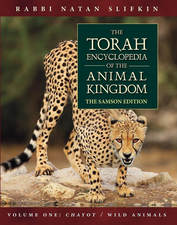
The funny thing about this is that lions do a great deal of sleeping. They don't seem to be the best example of strength when it comes to waking up. What is being learned from the lion?
Rabbi Natan Slifkin, in his 'The Torah Encyclopedia of the Animal Kingdom', has an insightful idea which helps explain the uniqueness of the lion and why, perhaps, it plays such an important role in Jewish imagery.
Photo by McKylan Mullins from Pexels
PodcastsTexts
HighlightsThe Keys to the Heavens (Perek 22)
In this perek, Yeshayahu describes a most unusual image. It talks of the priests on the rooftop of the temple. Here are Yeshayahu's words: Yeshayahu 22:1
מַשָּׂא, גֵּיא חִזָּיוֹן: מַה-לָּךְ אֵפוֹא, כִּי-עָלִית כֻּלָּךְ לַגַּגּוֹת
The “Valley of Vision” Pronouncement. What can have happened to you That you have gone, all of you, up on the roofs
What are the people doing up on the rooftops exactly? It is unclear. Chazal give us the subtext in a most stunning idea to be found in Talmud Bavli, Taanis 29b
תנו רבנן משחרב הבית בראשונה נתקבצו כיתות כיתות של פרחי כהונה ומפתחות ההיכל בידן ועלו לג ההיכל ואמרו לפניו רבונו של עולם הואיל ולא זכינו להיות גזברין נאמנים יהיו מפתחות מסורות לך וזרקום כלפי מעלה ויצתה כעין פיסת יד וקיבלתן מהם והם קפצו ונפלו לתוך האור
ועליהן קונן ישעיהו הנביא (ישעיהו כב, א) משא גיא חזיון מה לך איפוא כי עלית כולך לגגות תשואות מלאה עיר הומיה קריה עליזה חלליך לא חללי חרב ולא מתי מלחמה אף בהקב"ה נאמר (ישעיהו כב, ה) מקרקר קיר ושוע אל ההר:
The Sages taught: When the Temple was destroyed for the first time, many groups of young priests gathered together with the Temple keys in their hands. And they ascended to the roof of the Sanctuary and said before God: Master of the Universe, since we did not merit to be faithful treasurers, and the Temple is being destroyed, let the Temple keys be handed to You. And they threw them upward, and a kind of palm of a hand emerged and received the keys from them. And the young priests jumpedfrom the roof and fell into the fire of the burning Temple.
And the prophet Isaiah lamented over them: “The burden of the Valley of Vision. What ails you now that you have all gone up to the roofs? You that were full of uproar, a tumultuous city, a joyous town, your slain are not slain with the sword, nor dead in battle” (Isaiah 22:1–2). This is referring to the young priests who died by throwing themselves off the roof into the fire.
That fateful day of the destruction of the Mikdash does have a silver lining. The keys of access to the Mikdash were not left in human hands. Although the hosts of the enemy callously trampled every inch of it, they did not have the keys to access the spiritual epicenter of the Mikdash. They were lacking the keys.
The City of Tyre (Perek 23)
In this chapter, the concluding chapter relating to the nations of the world, Yeshayahu focusses on Tzor or Tyre. Interestingly enough, he spends less time describing Tyre than the impact its fall will have on the entire Mediterranean Sea trade. Yeshayahu 23:1
מַשָּׂא, צֹר: הֵילִילוּ אֳנִיּוֹת תַּרְשִׁישׁ, כִּי-שֻׁדַּד מִבַּיִת מִבּוֹא, מֵאֶרֶץ כִּתִּים, נִגְלָה-לָמוֹ
The “Tyre” Pronouncement. Howl, you ships of Tarshish! For havoc has been wrought, not a house is left; As they came from the land of Kittim, This was revealed to them.
To really appreciate this, one needs to be somewhat familiar with the Mediterranean Sea trade routes and the important port cities of the time.
Today, Tyre is still one of the port cities in Lebanon, albeit less of a center than Beirut.
CommentsPodcastsText
HighlightsMoav Perakim 15-16
This perek points to one of the reasons of Moav receiving such a devastating end was its lack of willingness to take in the fleeing Israelites from the destruction of Assyria of the Northern Kingdom. This repeated itself many times in Jewish history. One unfortunate episode occurred in 1938 at the Evian Conference in France.
Reflecting the opinion of many delegations, the Australian representative, T. W. White, explained: “As we have no real racial problem, we are not desirous of importing one.”
But the food was superb, and the vistas breathtaking, and everyone tried to exude good will. In fact, if success could be measured by good will alone, the Evian Conference would have been judged a roaring success. But day after day reporters sensed a failure all but inevitable. By the end it was clear to everyone, not just to the reporters, that little had been accomplished. Hopes had been raised, and then dashed. The Evian Conference went down in history as a complete flop. Only one nation, the Dominican Republic, agreed to accept 100,000 refugees. Hitler, not known for his humor, was supposed to have joked: “We…are ready to put all these criminals at the disposal of these countries,” adding: “for all I care, even on luxury ships.” - Refugee crises and the sad legacy of the 1938 Evian conference, Marvin Kalb Damascus
In this perek, although Damascus is given the prophecy of destruction, Yeshayahu turns to the destroyers of Damascus which is Assyria. Yeshayahu closes with a powerful line:
לְעֵת עֶרֶב וְהִנֵּה בַלָּהָה בְּטֶרֶם בֹּקֶר אֵינֶנּוּ זֶה חֵלֶק שׁוֹסֵינוּ וְגוֹרָל לְבֹזְזֵינוּ׃
At eventide, lo, terror! By morning, it is no more. Such is the lot of our despoilers, The portion of them that plunder us.
Assyria is a metaphor for the many forces which tried over history to destroy the nation of Israel. Overnight they cease to exist.
In poetic terms, Lord Byron expresses this idea in his 1815 poem, The Destruction of Sennacherib
Like the leaves of the forest when Summer is green,
That host with their banners at sunset were seen: Like the leaves of the forest when Autumn hath blown, That host on the morrow lay withered and strown. For the Angel of Death spread his wings on the blast, And breathed in the face of the foe as he passed; And the eyes of the sleepers waxed deadly and chill, And their hearts but once heaved, and for ever grew still! Gog Umagog - Perek 18
As we learned there is a debate between between the Malbim and the rest of the Mefarshim whether this perek refers to the destruction of Assyria during the time of Chizkiyahu or referring to the times of Mashiach in the future.
For the other accounts of this episode see Ezekiel 38-39 and Zechariah 14 Egypt - Perek 19
In this Perek, Egypt's destruction is captured in the conflicted term, Isaiah 19:22
וְנָגַף יְהוָה אֶת־מִצְרַיִם נָגֹף וְרָפוֹא וְשָׁבוּ עַד־יְהוָה וְנֶעְתַּר לָהֶם וּרְפָאָם׃
The LORD will first afflict and then heal the Egyptians; when they turn back to the LORD, He will respond to their entreaties and heal them.
Rav Chaim Cohen, in his Sefer Talelei Chaim, Shmos page 111-12, quoting the Zohar that this refers to the fact the plagues in Egypt had a duel audience. As Egypt was being smitten, that same action allowed for the healing of the nation of Israel and their ability to become a nation.
Comments |
Nach YomiHere's the way it works. From Monday to Thursday I will be posting a 5 minute podcast of the chapter of the day. It will be a brief summary with a few points to ponder. I will also be sending out the Sefaria text so you can use it. Archives |
Proudly powered by Weebly



